Bars Closed, But Columbus Kept Drinking
On the afternoon of Sunday, March 15, Ohio Gov. Mike DeWine order bars and restaurants to close by 9pm that night. Coming days before the arrival of spring, it was a stunning blow to owners, employees and customers alike. Closing bars would end the socializing done there, but it would not slow down drinking. Liquor sales spiked immediately, with the state reporting a nearly 25% increase in year-over-year sales in March alone.
Offering cocktails to-go became a possibility for liquor-license holders under an emergency exemption. Several Columbus breweries began offering home delivery of beer for the first time. Distilleries discovered a new product line in hand sanitizer, a high-alcohol mixture with soaring demand and limited availability.
Although a pandemic changed their world, these companies were able to find their way.
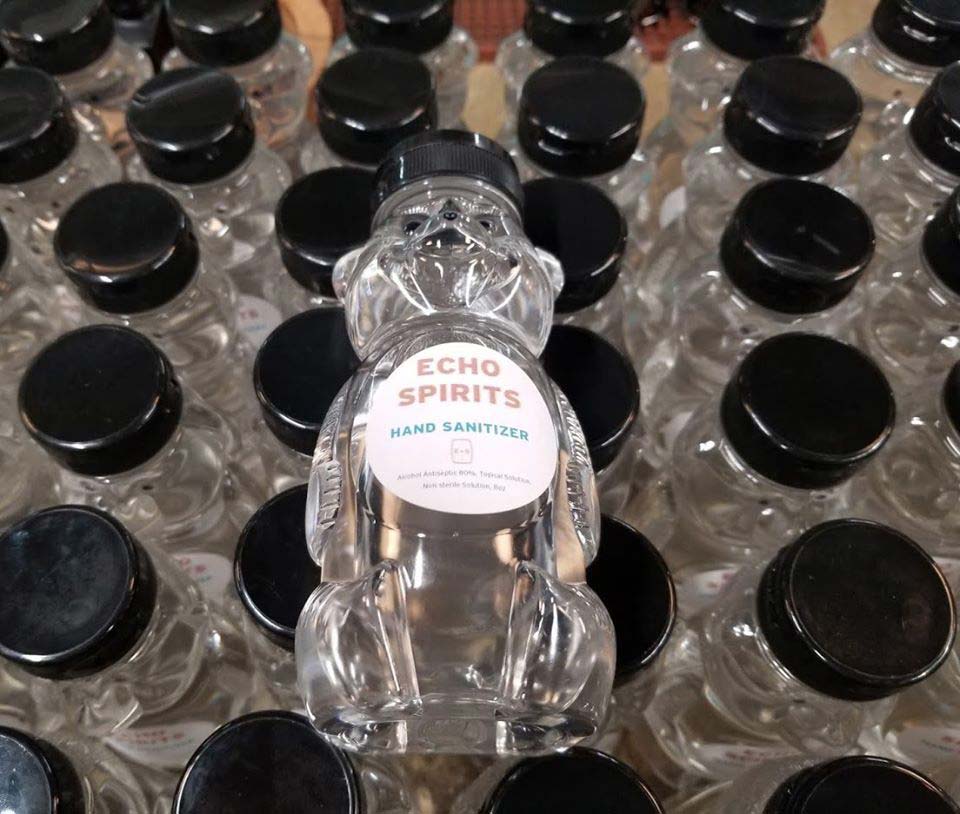
The search for hand sanitizer packaging resulted in some novelty bottles. Photo courtesy of Echo Spirits.
ECHO SPIRITS DISTILLING CO.: AN UNEXPECTED PIVOT
For Joe Bidinger and Nikhil Sharoff, owners of Grandview’s Echo Spirits Distilling Co., the long-awaited launch of the bar inside their craft distillery—originally slated to open in March—quickly became another COVID-19 casualty. Fortunately, according to Bidinger, the opening is simply on hold as the entrepreneurs weather the storm and formulate a safe operation at the era of the coronavirus.
“In a way, we were kind of happy we hadn’t opened yet,” Bidinger says about Echo Spirits’ cocktail bar. “We don’t have to make tough decisions in the next several weeks about when to open, whether it’s safe for employees, whether it’s safe for guests. We’re just going to watch the bar and restaurant industry run through the ropes and figure out the best practices we should adopt when we officially launch the bar.”
In the meantime, the duo’s flagship product—a white rum—has been available in the distillery’s onsite liquor shop, open throughout the crisis. They also launched the Stay Home Cocktail Club, a weekly video series featuring top Columbus bartenders demonstrating how to make various cocktails at home. Additionally, due to COVID-19, Bidinger says the small enterprise added a new and very unexpected product to their line: hand sanitizer.
Throughout this period, Bidinger and Sharoff have maintained their work at the distillery, perfecting the next product in their liquor line—a Genever, a Dutch grain-based liquor rich in botanicals—and crafting hand sanitizer for sale to businesses and individuals as the coronavirus lingers. Bidinger says that currently nearly 100% of the company’s production is focused on sanitizer. Though it took Echo Spirits a bit longer than their peers to get up and running with the product, they have been producing at full force in recent months.
“Those first few weeks as a distilling community, both locally and nationally, were kind of chaotic,” Bidinger recalls about the early days of COVID-19 in the United States. “There was a lot of conflicting information and back and forth with government agencies” about making sanitizer. “Even things like, ‘We’re not going to prosecute you if you do it incorrectly, but do it to the best of your knowledge,’ were discussed. It was all about managing risk.”
As Bidinger and Sharoff watched colleagues in the distillery community adapt to hand sanitizer production, the two decided to jump in headfirst. Bidinger says it made sense during the height of the crisis because the distillery’s sugar and molasses supplier for its rum shut down for a couple weeks. As of mid-May, the two said they had not made a batch of rum in several months.
Bidinger says one of the challenges facing them in their pivot was sourcing packaging for the sanitizer. “You’d go to one supplier and they’ve got tons of bottles but no caps,” he explains. “You go to another and they’ve got caps but no bottles. So, you end up ordering from all over the place to piece it together.” Bidinger says that many suppliers won’t have packaging until later this summer. Due to this, he says he and Sharoff invested heavily upfront in the hope that the venture would pan out.
As a variety of businesses and organizations across the region reopen, Bidinger says Echo Spirits’ focus is now on marketing hand sanitizer to them. The duo has also begun to revisit their original business plan. “We will continue the sanitizer production,” Bidinger says. “But we are also trying to bring the Genever to market, we are working on getting the bar open in a safe way, and as other bars and restaurants open back up, we hope to start marketing to them again to get our product on shelves and cocktail menus across the city.”
—Nicole Rasul
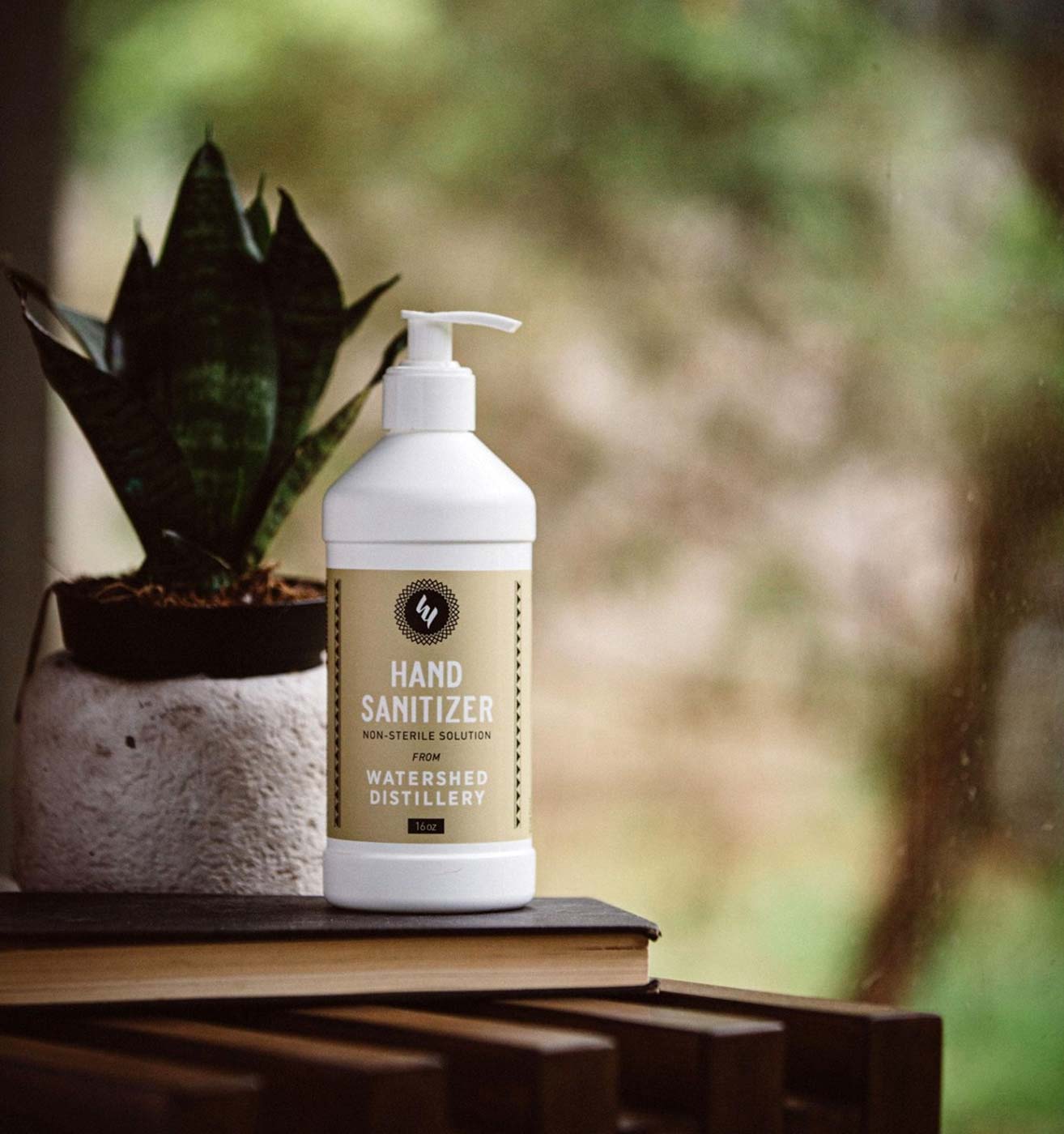
On its Facebook page, Watershed Distillery offered discounted hand sanitizer to first responders.
WATERSHED DISTILLERY: ADAPTING TO THE SITUATION
When Greg Lehman, founder and CEO of Watershed Distillery, first heard the governor’s order for restaurant closures, he was in shock. Lehman said even though he was expecting this kind of news to come, it didn’t take away the initial jarring feeling. His first thoughts went not only to his team, but to all the incredible restaurant partners that Watershed has around the city. He knew the number of individuals and families this would affect was immense.
Lehman briefly considered what a carryout-only operation might look like for Watershed Kitchen and Bar, frequently mentioned among the city’s best restaurants. Because of the shift that would be required in all facets of the business and his desire to keep his team safe, he decided to temporarily pause operations on the bar and restaurant side. While considering how he could provide for his team, and seeing countless stories of frontline workers without proper personal protection equipment, the idea to make hand sanitizer was born.
The sanitizer program started out small, with Watershed first producing a batch for a local firehouse. Watershed then made enough for a few local police stations and hospitals. Seeing that there was a real and continuing need, the team took stock of their materials and space and decided they could transform operations and really make an impact. Once they decided to fully transition, Watershed worked quickly to serve the increasing needs of the community. The response to Watershed producing hand sanitizer was overwhelmingly positive and they continued to sell sanitizer to frontline workers, businesses and the public almost daily.
Watershed also started a GoFundMe campaign to feed their team in the very early days of the restaurant’s temporary closure. Lehman said that friends, family, strangers, neighbors and beyond reached out asking how they could support once the news of the temporary closure hit. The generosity of Watershed’s strong fan base, along with Lehman and head chef Jack Moore wanting to do something to support the team, resulted in a weekly staff meal program that included ingredients, produce, supplies and necessities.
When things return to a new normal, Lehman knows his team will be ready. Watershed has proven to be incredibly dynamic by successfully flipping the business model at the drop of the hat. Lehman said that he knew the scrappy, flexible mentality existed at Watershed, but this experience has truly solidified it.
—Anna Kurfees
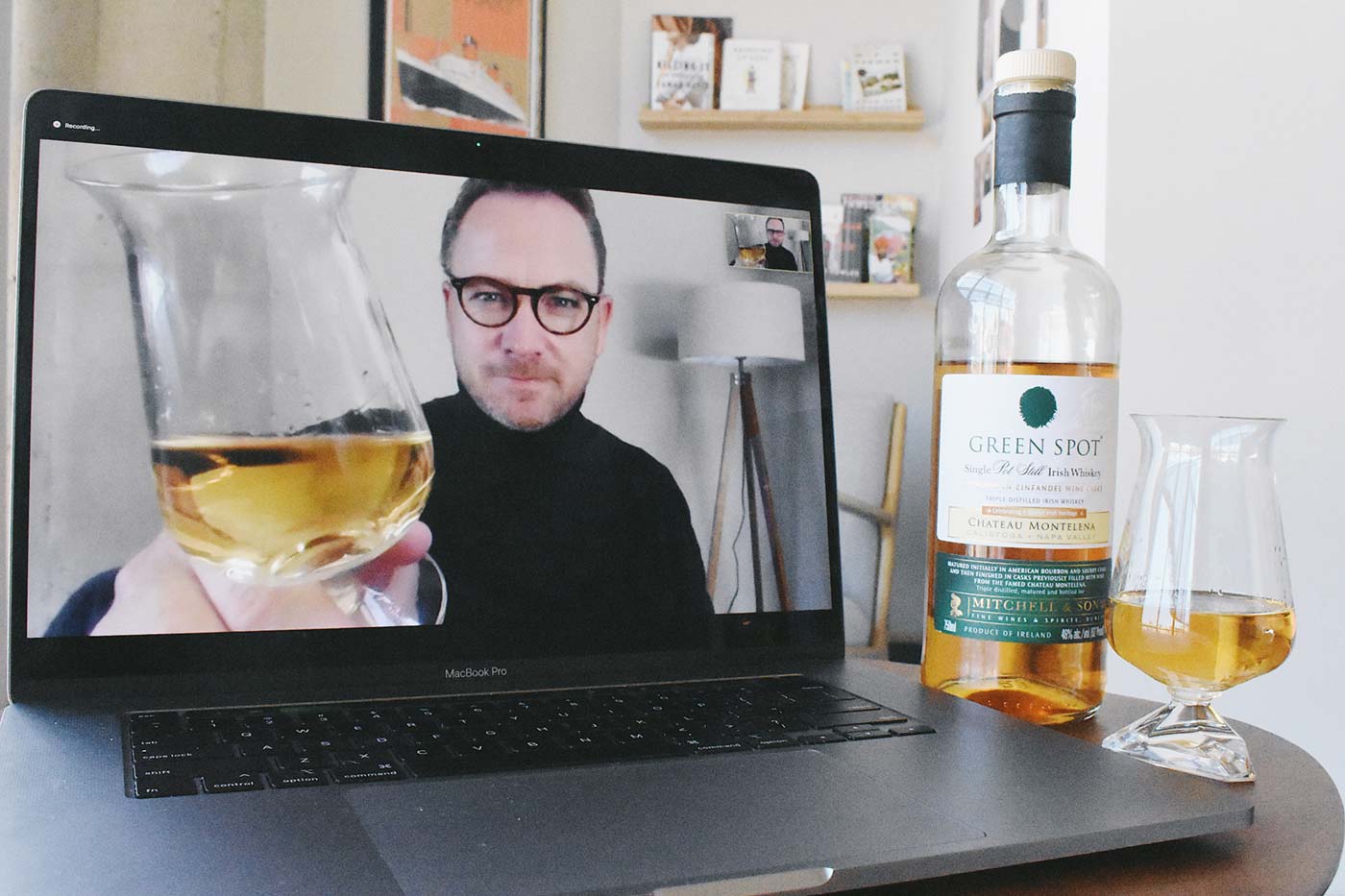
Barry Chandler launched a series of virtual Irish whiskey tastings on Zoom. (Photo by Malinda Meadows)
STORIES & SIPS: VIRTUAL IRISH WHISKEY TASTINGS
In Irish, sláinte means “to your health.” It’s a common drinking toast in Ireland, one that might be shared in a local pub, surrounded by family, friends and neighbors, or in Ohio if you ever find yourself around Barry Chandler, an Irishman now living here. At least, that was the case until the novel coronavirus began sweeping across Columbus, forcing its residents to shelter at home, and its once vibrant restaurant and bar scene to go quiet.
Soon after the sharing of drinks and clinking of glasses stopped, many began to witness one of the virus’ greatest side effects start to emerge: isolation.
“I realized very quickly that the isolation and quarantining were going to become very challenging for people who were used to community and connection,” says Chandler, “and that without that, we’d be missing something that’s crucial to who we are and our very happiness and health.”
To combat this sense of loneliness and reinstill a sense of community, Chandler took to the video conferencing tool Zoom in a novel way for a very old purpose: gathering around a watering hole. He invited people to join him in weekly virtual Irish whiskey tastings—but this time, from the safety of their homes.
Known as Stories & Sips, these tastings originally began in 2016 and were held in person. Just because current social distancing measures had turned drinks at the bar turned into drinks at home, he didn’t think anyone should have to drink alone.
“We use Zoom to connect with people from Ohio—and in some cases from around the world—over weekly stories and sips. It might be a specific Irish distillery or whiskey we’ll talk about, and all attendees are encouraged to bring that whiskey to the Zoom tastings if they can get it. We let them know where they can find the whiskeys, especially in Ohio, and they can taste the whiskeys along with me while I share their tales and their tastes,” says Chandler.
Imbibers joining the virtual whiskey tastings will learn some technical aspects of Irish whiskey, hear a few stories of the people and places that make up Ireland, and indulge in a few sips, but they’re also getting something much more: a welcoming virtual community and a sense of connection during the coronavirus pandemic.
“I’ve learned that people are now setting their calendar to turn up to these tastings. They’ve shared that this is one of the highlights of this week because they get to ask questions, have conversations with people who like what they like, and they learn, and they have a laugh, and it maybe makes the isolation a little bit more bearable it times when so much is challenging. They’re even connecting with each other online between tastings.”
As we continue to grapple with a virus that keeps us apart, a virtual community might be just the tonic we need until we can all clink glasses again in person.
Sláinte!
To join in the next virtual Irish whiskey tasting via Facebook, visit irishwhiskeyfans.com.
—Malinda Meadows
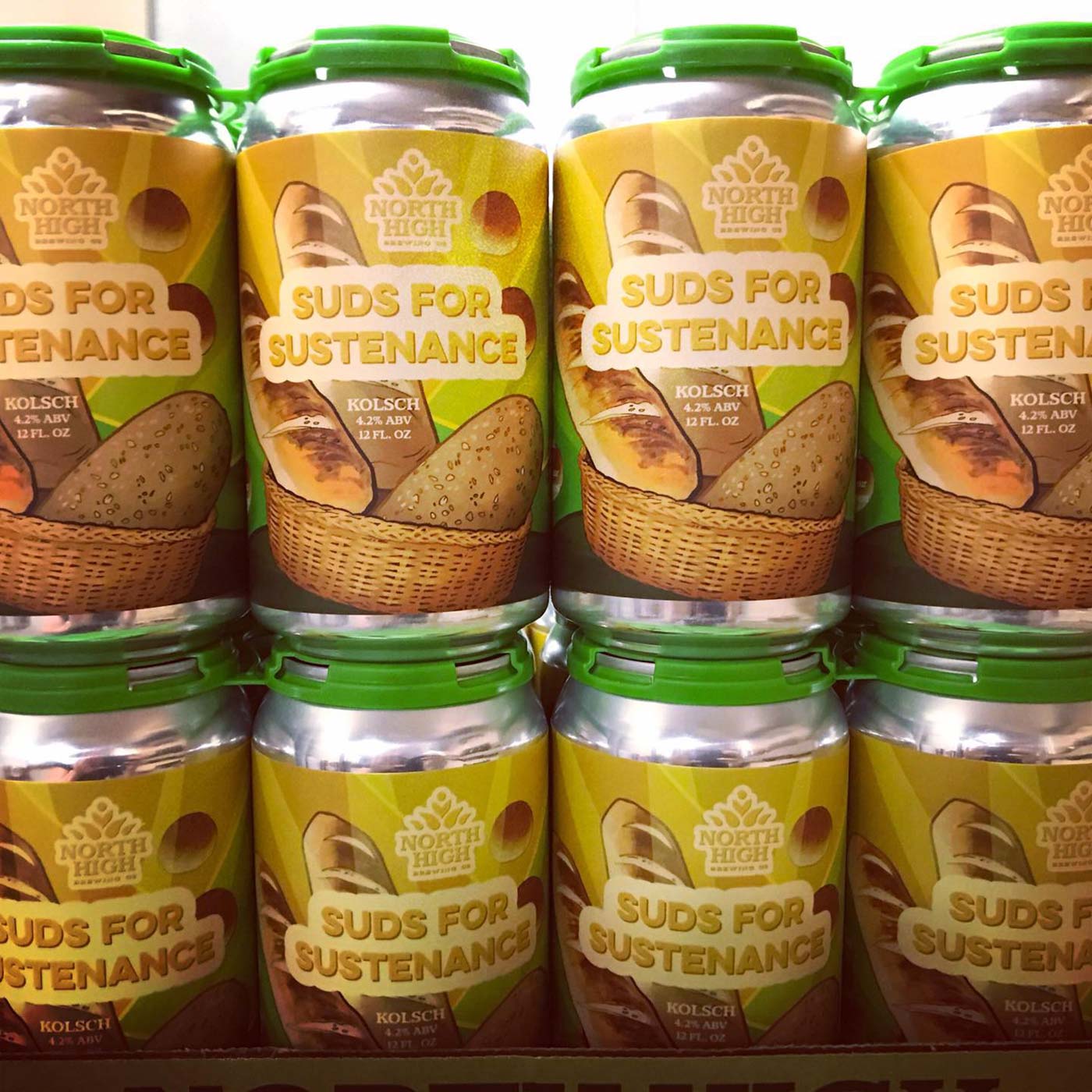
North High Brewing made a new beer, Suds for Sustenance, to raise money for Mid-Ohio Food Bank. Photo courtesy of North High Brewing.
NORTH HIGH BREWING DELIVERS THE GOODS
North High Brewing began the year with a bustling taproom in the Short North and plans to open another in Dublin. Their lineup of more than a dozen beers was available in bars and restaurants and in retail stores. The state order closing bars and restaurants in March wiped out all those venues except retail sales—and about half the brewery’s revenue.
If people were going to stay at home, they decided, that’s where the beer had to go, too. So North High launched a beer home-delivery service. “That was a very spur-of-the-moment decision,” said Kelsey Stief, the brewery’s marketing director. “We pivoted to delivery to bring in some kind of revenue. We had the beer, and we had to figure out a way to move it.”
With much of the taproom staff laid off, Stief took on the delivery job herself, accepting orders first by email and later online. Driving a North High van, she hit the road three days a week, dropping off cases of beer with a thank-you card on doorsteps. She estimates that she drove 5,000 miles and delivered 500 cases of beer.
Among the cases Stief delivered was a new Kolsch-style beer—Suds for Sustenance—that North High launched to raise money for the Mid-Ohio Food Collective. “We wanted to do something to give back, and the food bank is helping families in desperate need,” she said. “I hope people understand that even as Ohio starts to reopen, the need for some families is not going to go away anytime soon.”
Stief said that work has continued on North High’s new Dublin brewpub, which is taking over the building that housed Brazenhead for more than 20 years before it closed last year. “This gave us time to really finish the construction there and revamp some stuff. We actually redid parts of the Short North taproom as well.” They were able to bring employees back to work as the original taproom reopened at the beginning of June, and the Dublin location is soon to follow.
“When everything gets ready to open, we’ll be ready to rock,” she said. “And I think we’ll be stronger coming out of this than we were going into it.”
—Gary Kiefer
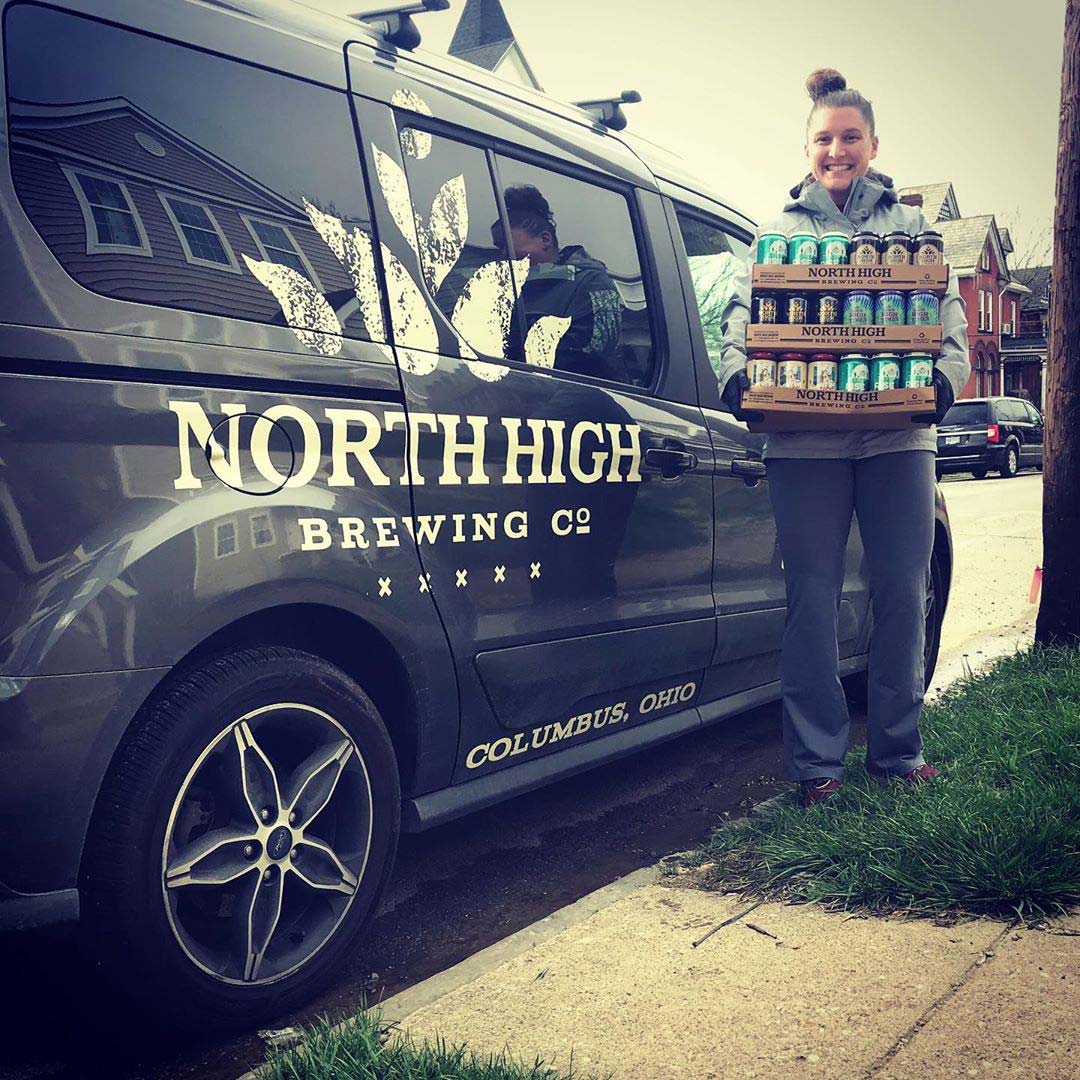
Kelsey Stief took to the road to deliver hundreds of cases of beer to customers. Photo courtesy of North High Brewing.





